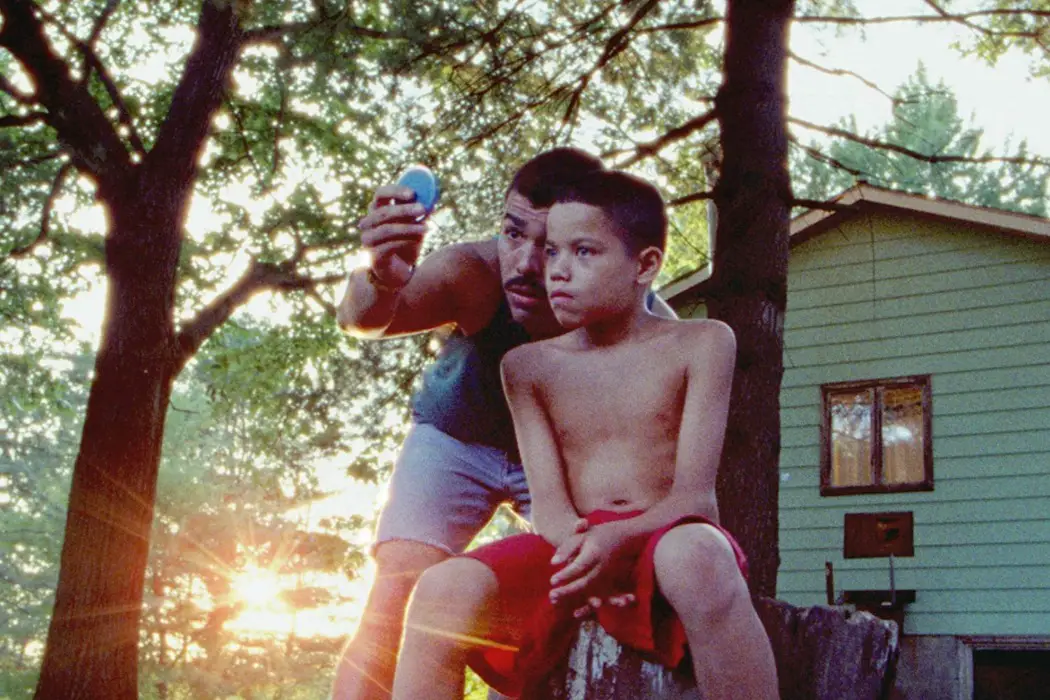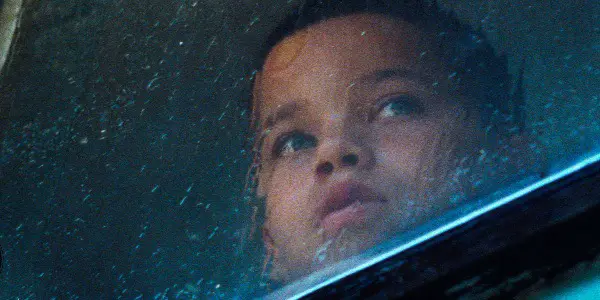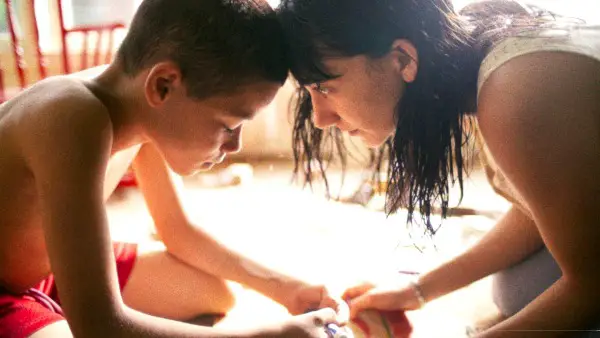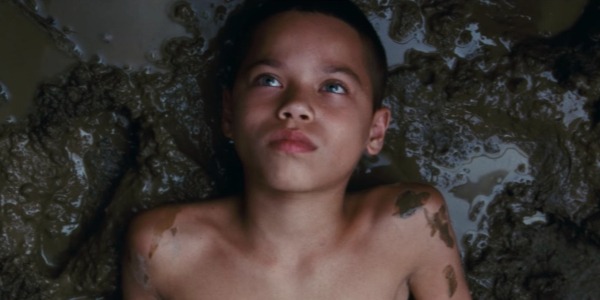WE THE ANIMALS: Coming Of Age Drama Trapped In Moonlight’s Shadow

Alistair is a 25 year old writer based in Cambridge.…
Capturing the saddest moments of human existence through a child’s eyes remains one of the core storytelling techniques filmmakers rely on to convey the harrowing nature of their stories, without overwhelming audiences with distress.
From Life is Beautiful capturing the holocaust from a child’s eye view, to smaller scale domestic dramas like the bitter divorce battle presented in the recent French film Custody, using a child’s perspective means that filmmakers can simplify their approaches to complicated subjects, while still ensuring that we see their young characters mature due to these circumstances.
An Autobiographical tale that feels too familiar
We the Animals is somewhat more complicated. Adapted from Justin Torres’ semi-autobiographical 2011 novel, we are shielded from directly seeing the distress of the protagonist’s home life, yet are acutely aware of his own personal demons that he’s trying to hide – namely, his sexuality, which he’s only becoming aware of just as he notices the toxic masculinity his older brothers and father represent.
Director Jeremiah Zagar, in his feature directorial debut, never undercuts the sheer sadness inherent within this living arrangement, but his frequent retreats into fantastical dream sequences (which frequently contrast with the lead character’s surrounding environment), results in an unsatisfying character study.

Character growth remains stagnant despite the life altering revelations, as the lead character prefers to present himself as a blank slate both before and after his realisation, opting to live in a fantasy realm rather than confront his inner torment. The source material commits to following a dark trajectory, inspired by the author’s own life. This adaptation, although earnestly felt, doesn’t offer a similar sense of direction. It’s a moving drama and a candidly captured portrait of a devastating childhood – but a reliance on magical realist intervals detracts from both the raw emotional power of the story, and stops us ever truly getting under the skin of the character beyond broad brush strokes.
Set in upstate New York in an unspecified period during the 1980’s, We the Animals follows three mixed race brothers of white American and Puerto Rican descent. The two, slightly older, brothers Manny and Joel begin to resemble their father (played by Raúl Castillo, from HBO’s Looking); they’re dismissive of their mother (Shiela Mand), although not to the same physically abusive extremes the film leads us to believe their father is. Their hyper masculine behaviour leads to petty thievery and other youthful delinquent behaviour around the neighbourhood – with younger brother Jonah (Evan Rosado) tagging along but growing increasingly insular on contrast. He’s a sensitive boy, with a passion for drawing, frequently hiding under the bed where the three brothers sleep where he keeps a secret stash of his artwork.
One day, when the brothers are stealing fruit from crops, the owner of the land invites them over for food. Jonah ends up befriending the man’s grandson, who in turn shows them his VCR porn tape – which includes a brief glimpse of gay porn that is something of a penny dropping moment for Jonah. As he grows increasingly alienated from his family, he begins to lash out, desperately trying to discover his own identity while making sure nobody becomes aware of it.
Can’t fight the Moonlight (comparisons)
Several reviews have described We the Animals as being a distinctive cross between Moonlight and Beasts of the Southern Wild. Although the film largely works on its own terms, it is to the detriment of director Jeremiah Zagar that this somewhat dismissive comparison is inescapable; the character of Jonah is near identical to Little, the name of the central character of Moonlight during the first act, where he too had a similarly complicated relationship with a father figure.
In both films, that relationship is shown to be tender, without softening the harsher edges of either father figure character – although, due to presenting the abuse of the mother entirely off screen and only alleging to it, We the Animals does pull some punches in its portrayal of a complicated figure.

Evan Rosado gives one of the best child performances of the year, but he is hampered by an earlier film that followed the same beats, and had much more expressive direction to convey its protagonist’s internal anguish – Barry Jenkins delved deep into the tortured soul of his similar protagonist, while Zagar doesn’t fully get under the skin.
Zagar can definitely get great performances from his cast – but his direction is somewhat indistinctive, with the same vaguely Malick-inflected visuals (as well as the cutesy, hand drawn animated interludes of your average “quirky” Sundance film) as several other independent American filmmakers. In a way, it’s oddly fitting that for a film about a child avoiding airing their true voice, there’s a director equally willing to show a unique sense of style behind it.
Which isn’t to say that the contents of the story itself don’t have the ring of truth about them, as Zagar (working with co-screenwriter Dan Kitrosser) does vividly capture the specific details of a tortured childhood right down to the minutiae. The most harrowing moments, for me, were the sights of the two older brothers laughing upon seeing their father getting into arguments with voices of authority – be they a boss who fired him in front of his kids, or their mother, angry at his extended disappearance only to return home with a vehicle unsuitable for family use.
Castillo’s performance works in perfect sync with that of the two older brothers, played by Isaiah Kristian and Josiah Gabriel, as they all give off the impression of sweet, loving innocence until thrown into positions were they’re held up to scrutiny.

In fact, I’d go as far to say that We the Animals is a far more confident film when addressing the trials and tribulations of this poverty stricken family unit as a whole, rather than focusing on its cumulative effects on the younger son. In addition to domestic abuse, we see a mother whose crippling depression is causing her to be increasingly absent from her children’s lives (leaving them hungry and incessantly belligerent towards her), and even glimpses of an entire neighbourhood that looks upon a Puerto Rican family with a quiet scorn when they walk past. It’s a harrowing rendering of a stifling environment – which makes it all the more disappointing that the pseudo-coming out narrative doesn’t have the same power, feeling overly familiar to recent indie hits despite its somewhat autobiographical nature.
Conclusion: We The Animals
We the Animals is an undeniably moving film, but one whose emotional power is curbed by its similarity to other notable US indies of recent years. The source material may have been published prior to the release of Moonlight or Beasts of the Southern Wild – but despite great performances and cinematography, Jeremiah Zagar’s film can’t rise out of the shadows of those other notable efforts.
What did you think of We the Animals? Let us know in the comments below!
We the Animals will be released in the US on August 17, 2018. For all international release dates, see here.
Does content like this matter to you?
Become a Member and support film journalism. Unlock access to all of Film Inquiry`s great articles. Join a community of like-minded readers who are passionate about cinema - get access to our private members Network, give back to independent filmmakers, and more.
Alistair is a 25 year old writer based in Cambridge. He has been writing about film since the start of 2014, and in addition to Film Inquiry, regularly contributes to Gay Essential and The Digital Fix, with additional bylines in Film Stories, the BFI and Vague Visages. Because of his work for Film Inquiry, he is a recognised member of GALECA, the Gay & Lesbian Entertainment Critics' Association.













